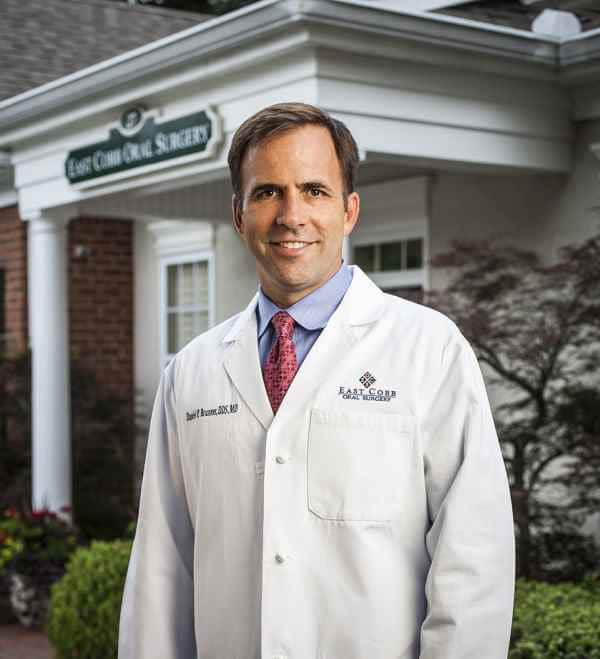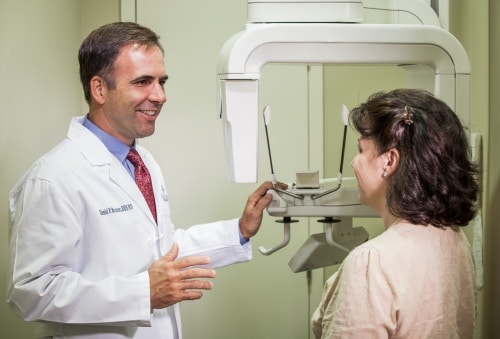Dr. Daniel Brunner was born and raised in Huntington Beach, CA. He attended the University of Missouri-Kansas City School of Dentistry where he graduated with highest honors, Summa Cum Laude, and received his Doctorate of Dental Surgery. He then returned to Southern California where he attended the University of Southern California, Keck School of Medicine, and received his Doctorate of Medicine. Dr. Brunner completed his residency in Oral and Maxillofacial Surgery at the University of Southern California. He had the privilege of serving as Chief Resident of the Oral and Maxillofacial Surgery Department at Los Angeles County Hospital, the largest Trauma Hospital in the country, from 2001-2002. Following his Oral and Maxillofacial Surgery Residency, Dr. Brunner went on to pursue an additional year of surgical training in General Surgery at St. Joseph Hospital in Denver, CO. Dr. Brunner’s additional medical training sets him apart from most other Oral and Maxillofacial Surgeons in that he is able to diagnose and treat his patients with a complete medical and dental understanding.
Dr. Brunner moved to Atlanta, Georgia, in 2003, where he established his Oral and Maxillofacial Surgery practice, East Cobb Oral Surgery. In his private practice Dr. Brunner specializes in Dento-Alveolar Surgery, Dental Implant Surgery and Bone Grafting Surgery. In 2007, Dr. Brunner founded Impact Health International, a US 501(c)(3) nonprofit organization bringing dental education and services to third world countries. Since 2007, Impact Health International has donated over $2,500,000 in dental services to numerous third world countries.
Dr. Brunner is a strong advocate of continuing dental education, both personally, as well as, professionally. He attends over 100 hours of continuing dental and medical education a year, is active in dental research, keeps current on the latest advancements in dental implant and bone reconstructive surgery, while also advocates to others the importance of continuing advanced dental education. Dr. Brunner created a Hands-On, Live Patient Surgery, Dental Implant Training program, Implants in Paradise, where he teaches dentists hands-on training of dental implant placement, sinus augmentation and bone grafting techniques on live patients in the Dominican Republic. In addition, he has created an on-line dental database of continuing education programs, Dental CE in Paradise, for dentists to complete their continuing education requirements.
Dr. Brunner is a highly esteemed lecturer and has had the privilege to lecture both domestically and internationally. He currently lecturers for MIS Implants at their Dental Implant Training Centers (DITC) located throughout the [COUNTY], as well as, for the Academy of General Dentistry Mastertrack continuing dental education program. Most recently Dr. Brunner was a guest lecturer for the American Academy of Implant Dentistry (AAID) for their 2013 Annual Convention. He was also the keynote speaker for the Latin American Academy of Osseointegrated Dental Implants (LAODI) annual conference. Dr. Brunner has also published research articles in various dental journals.
Dr. Brunner has been married to his wife Melissa for 21 years and they have 4 children, Daniel Jr., Hannah, Rachel, and Paul. In his spare time Dr. Brunner enjoys Surfing, Wake Boarding, English Fox Hunting and Organic Farming.
Dental Implants
Dental implants are changing the way people live. They are designed to provide a foundation for replacement teeth that look, feel, and function like natural teeth. The person who has lost teeth regains the ability to eat virtually anything, knowing that teeth appear natural and that facial contours will be preserved. Patients with dental implants can smile with confidence.
What Are Dental Implants?
The implants themselves are tiny titanium posts that are surgically placed into the jawbone where teeth are missing. These metal anchors act as tooth root substitutes. The bone bonds with the titanium, creating a strong foundation for artificial teeth. Small posts that protrude through the gums are then attached to the implant. These posts provide stable anchors for artificial replacement teeth.
Implants also help preserve facial structure, preventing bone deterioration that occurs when teeth are missing.
The Surgical Procedure
For most patients, the placement of dental implants involves two surgical procedures. First, implants are placed within your jawbone. For the first three to six months following surgery, the implants are beneath the surface of the gums gradually bonding with the jawbone. You should be able to wear temporary dentures and eat a soft diet during this time. At the same time, your dentist is forming new replacement teeth.
After the implant has bonded to the jawbone, the second phase begins. Dr. Brunner or Dr. Lazerson will then uncover the implants and attach small posts that protrude through the gums and will act as anchors for the artificial teeth. When the artificial teeth are placed, these posts will not be seen. The entire procedure usually takes six to eight months. Most patients experience minimal disruption in their daily life.
Surgical Advances
Using the most recent advances in dental implant technology, Drs. Brunner and Lazerson are able to place single stage implants. These implants do not require a second procedure to uncover them, but do require a minimum of six weeks of healing time before artificial teeth are placed. There are even situations where the implants can be placed at the same time as a tooth extraction – further minimizing the number of surgical procedures.
Dental Implant placement is a team effort between an oral and maxillofacial surgeon and a restorative dentist. While Dr. Brunner and Dr. Lazerson perform the actual implant surgery, initial tooth extractions, and bone grafting if necessary, the restorative dentist (your dentist) fits and makes the permanent prosthesis. Your dentist will also make any temporary prosthesis needed during the implant process.
What Types Of Prosthesis Are Available?
A single prosthesis (crown) is used to replace one missing tooth – each prosthetic tooth attaches to its own implant. A partial prosthesis (fixed bridge) can replace two or more teeth and may require only two or three implants. A complete dental prosthesis (fixed bridge) replaces all the teeth in your upper or lower jaw. The number of implants varies depending upon which type of complete prosthesis (removable or fixed) is recommended. A removable prosthesis (over denture) attaches to a bar or ball in socket attachments, whereas a fixed prosthesis is permanent and removable only by the dentist.
Drs. Brunner and Lazerson perform in-office implant surgery in a hospital-style operating suite, thus optimizing the level of sterility. Inpatient hospital implant surgery is reserved for patients who have special medical or anesthetic needs or for those who need extensive bone grafting from the jaw, hip or tibia.
Dental Implants Presentation
To provide you with a better understanding of dental implants, we have provided the following multimedia presentation. Many common questions pertaining to dental implants are discussed.
Why Dental Implants?
Once you learn about dental implants, you finally realize there is a way to improve your life. When you lose several teeth – whether it’s a new situation or something you have lived with for years – chances are you have never become fully accustomed to losing such a vital part of yourself.
Dental implants can be your doorway to renewed self-confidence and peace of mind.
A Swedish scientist and orthopedic surgeon, Dr. Per-Ingvar Branemark, developed this concept for oral rehabilitation more than 35 years ago. With his pioneering research, Dr. Branemark opened the door to a lifetime of renewed comfort and self-confidence for millions of individuals facing the frustration and embarrassment of tooth loss.
Why Select Dental Implants Over More Traditional Types Of Restorations?
There are several reasons: Why sacrifice the structure of surrounding good teeth to bridge a space? In addition, removing a denture or a “partial” at night may be inconvenient, not to mention that dentures that slip can be uncomfortable and rather embarrassing.
Are You A Candidate For Implants?
If you are considering implants, your mouth must be examined thoroughly and your medical and dental history reviewed. If your mouth is not ideal for implants, ways of improving outcome, such as bone grafting, may be recommended.
What Type Of Anesthesia Is Used?
The majority of dental implants and bone graft can be performed in the office under local anesthesia, with or without general anesthesia.
Do Implants Need Special Care?
Once the implants are in place, they will serve you well for many years if you take care of them and keep your mouth healthy. This means taking the time for good oral hygiene (brushing and flossing) and keeping regular appointments with your dental specialists.





